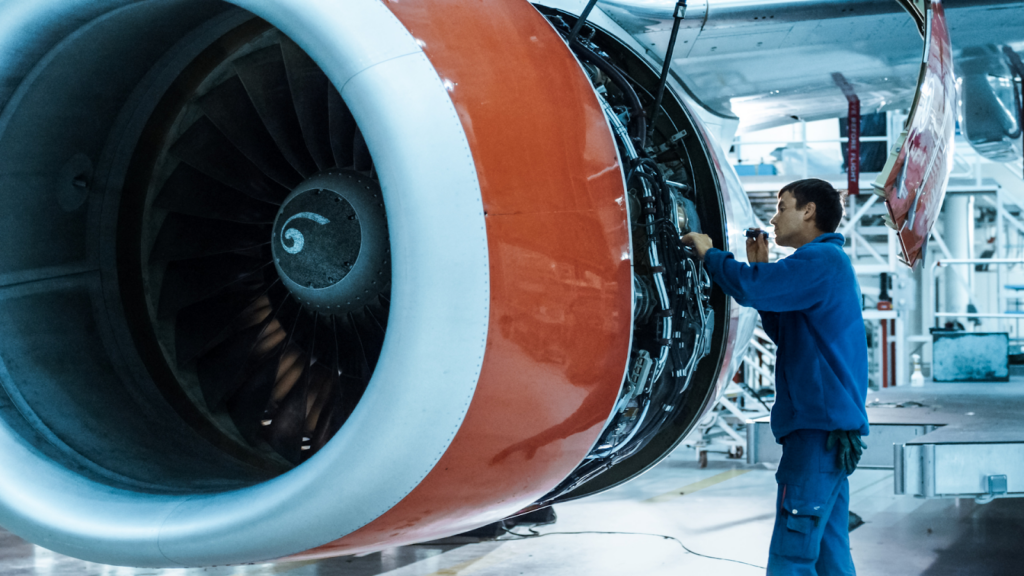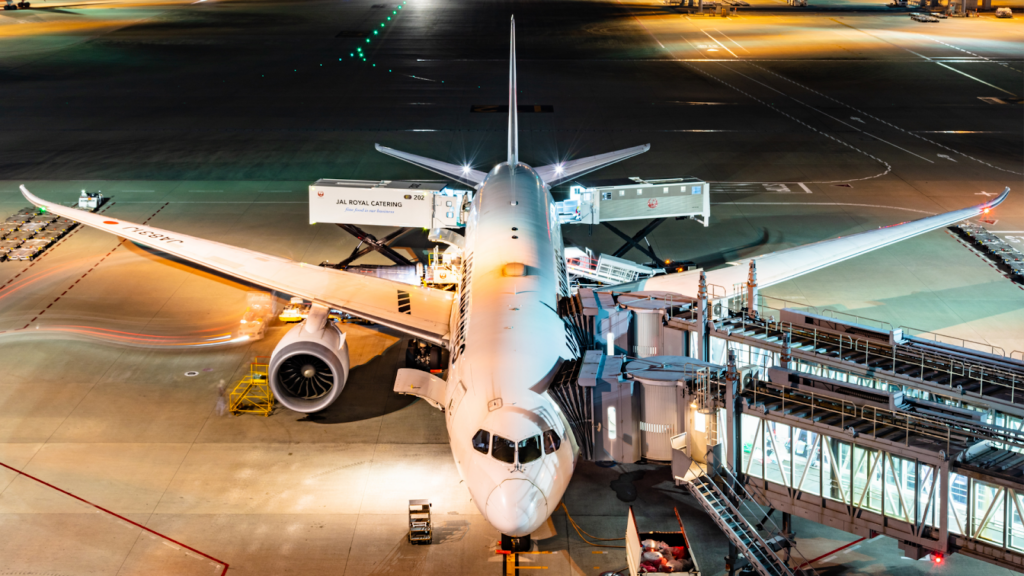Key Important Takeaways:
- Comprehensive Plating Solutions: We offer customized plating processes, including electroplating, anodizing, and advanced techniques like CVD and PVD, tailored to meet the specific requirements of aerospace components for enhanced durability and performance.
- Commitment to Quality and Compliance: Through strict adherence to aerospace standards and regulations, including AS9100 and NADCAP certifications, we ensure that all plating services meet the highest levels of quality and safety, making it a trusted partner in the aerospace industry.
In the demanding world of aerospace engineering, the durability and reliability of aircraft components are paramount. Aviation plating emerges as a critical process in this context, offering a robust shield against the relentless threats of corrosion and wear that parts face throughout their lifecycle.
As a leader in surface technologies, we stand at the forefront, offering comprehensive plating solutions that not only meet but exceed industry compliance standards.
By exploring the intricacies of aviation plating, we aim to provide insights into its indispensable role in aerospace manufacturing and maintenance, and why choosing a seasoned partner like us can make all the difference in achieving peak component performance and reliability.
Partner with Valence for excellence in aviation plating.
The Importance Of Aviation Plating
Protecting Against Corrosion And Wear
Corrosion and wear are among the aerospace industry’s most formidable adversaries, capable of compromising the integrity and functionality of critical aircraft components.
Aviation plating serves as a vital defensive measure, applying a protective layer to parts that significantly reduces their susceptibility to these destructive forces.
Enhancing Aircraft Longevity And Safety
The application of specialized coatings through aviation plating is not merely about maintaining component aesthetics or surface smoothness; it’s a critical investment in aircraft safety and longevity.
By shielding parts from corrosion and wear, aviation plating directly contributes to the overall structural integrity of the aircraft, minimizing the risk of failures in crucial systems. This preventive approach is essential for maintaining the highest safety standards in the aerospace industry, where there is no room for compromise.
Key Materials In Aviation Plating
Nickel, Chromium, And Titanium Alloys
The choice of plating materials plays a crucial role in determining the effectiveness of the aviation plating process. Nickel, chromium, and titanium alloys are among the most commonly used materials, each offering unique properties that enhance corrosion resistance, wear protection, and surface hardness.
The selection of these materials is based on a detailed analysis of the component’s operational demands, ensuring the plated layer offers the best possible protection and performance enhancement.
Selection Criteria Based On Application
Choosing the right plating material requires a deep understanding of the component’s application, including factors such as exposure to extreme temperatures, chemical environments, and mechanical stresses.
Our material selection process involves a thorough evaluation of these criteria, ensuring that the chosen plating solution optimally addresses the specific challenges each component faces.
Plating Processes For Aerospace Components
Electroplating For Durability
Electroplating is a cornerstone of aviation plating, known for its ability to deposit a dense, uniform metallic layer onto components. This process is especially valued for enhancing durability and electrical conductivity, making it ideal for parts that require both structural integrity and functional performance.
Our electroplating capabilities encompass a variety of metals, tailored to meet the stringent requirements of the aerospace industry.
Anodizing For Corrosion Resistance
Anodizing stands out for its ability to provide superior corrosion resistance, creating a hard, non-conductive surface layer that significantly extends the life of aluminum components. This process is essential for parts exposed to harsh environmental conditions, offering protection without compromising the material’s inherent lightweight characteristics.
Our anodizing techniques are meticulously designed to ensure the highest level of corrosion protection, aligning with aerospace industry standards for durability and performance.
Advanced Techniques For Specialized Applications
In addition to traditional plating methods, we employ advanced techniques to cater to the specialized needs of the aerospace industry. These include chemical vapor deposition (CVD) and physical vapor deposition (PVD), which are utilized to apply coatings that offer exceptional resistance to high temperatures and abrasive wear.
Our expertise in applying these advanced coatings ensures that your components achieve the highest standards of performance and durability.
Interested in leveraging the latest advancements in plating technology for your aerospace components? Contact us today to explore how our innovative solutions can elevate your project’s performance and durability, ensuring your components lead the way in aerospace excellence.
Challenges And Innovations In Aviation Plating
Addressing Environmental And Technological Challenges
The aviation plating industry faces ongoing challenges, including environmental concerns and the need for technological advancement. At Valence Surface Technologies, we are at the forefront of addressing these issues, implementing sustainable practices and exploring new plating technologies that reduce environmental impact while enhancing component performance.
Our commitment to innovation and sustainability is key to our mission, ensuring that our services not only meet current industry demands but also anticipate future trends.
Innovations And Future Directions In Plating Technologies
As the aerospace industry evolves, so too does the field of aviation plating. We are deeply invested in research and development, seeking out new materials and processes that offer improved performance, durability, and environmental compatibility.
By staying ahead, we ensure that our clients have access to the most advanced plating solutions available, positioning them for success in a rapidly changing industry.
Choosing Valence Surface Technologies
Expertise In Aviation Plating
Choosing Valence Surface Technologies for aviation plating means partnering with a leader in the field, known for our deep expertise and comprehensive service offerings. Our team of specialists brings years of experience to each project, ensuring that every component receives the highest level of attention and expertise. This depth of knowledge is a critical asset for clients seeking to navigate the complexities of aerospace component treatment.
Commitment To Customer Satisfaction And Compliance
At Valence, customer satisfaction and compliance are not just goals—they are foundational principles that guide every aspect of our operations. By working closely with clients to understand their needs and challenges, we deliver tailored plating solutions that not only meet but exceed expectations.
Final Thoughts On Aircraft Plating
Aviation plating is crucial in aerospace engineering, ensuring component safety, durability, and longevity by protecting against corrosion and wear.
At Valence Surface Technologies, we lead in providing comprehensive, customized plating solutions tailored to the aerospace industry’s needs. Our commitment to quality, innovation, and compliance makes us a trusted partner across the globe.
As the aerospace sector evolves, we continuously innovate to keep our clients at the forefront. Get a quote from us today to elevate your aerospace components with our expert plating solutions.
Frequently Asked Questions
What types of wear does aircraft plating protect against?
Aircraft plating protects against various types of wear, including adhesive wear (surface-to-surface contact), abrasive wear (external particles or rough surfaces), and fretting wear (micro-vibrations), enhancing the component’s longevity and reliability.
How does aircraft plating impact fuel efficiency?
By reducing component weight and improving aerodynamic properties through specific plating processes, aircraft plating can contribute to enhanced fuel efficiency in aerospace designs.
Can aircraft plating be customized for specific environmental conditions?
Absolutely. Valence tailors plating solutions to withstand specific environmental challenges, such as saltwater exposure or extreme temperatures, ensuring optimal performance regardless of operating conditions.
Are there any lightweight plating options available that maintain strength?
Valence offers lightweight plating options, such as titanium and aluminum coatings, that maintain or even enhance the strength-to-weight ratio of aerospace components.

